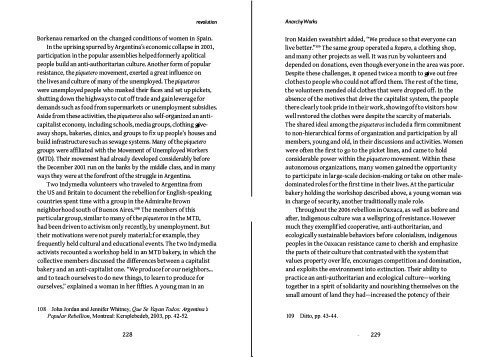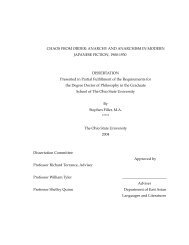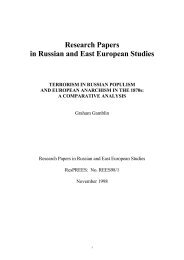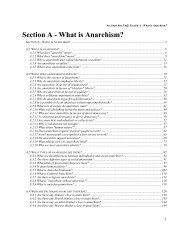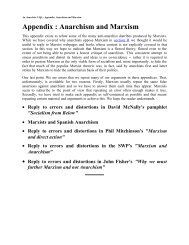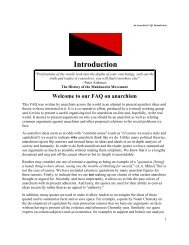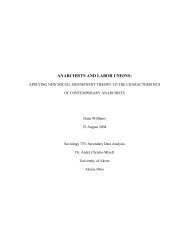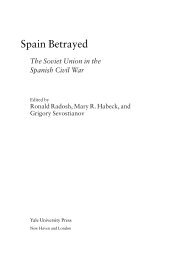Anarchy Works.pdf - Infoshop.org
Anarchy Works.pdf - Infoshop.org
Anarchy Works.pdf - Infoshop.org
You also want an ePaper? Increase the reach of your titles
YUMPU automatically turns print PDFs into web optimized ePapers that Google loves.
evolution<br />
<strong>Anarchy</strong> <strong>Works</strong><br />
Borkenau remarked on the changed conditions of women in Spain.<br />
In the uprising spurred by Argentina's economic collapse in 2001,<br />
participation in the popular assemblies helped formerly apolitical<br />
people build an anti-authoritarian culture. Another form of popular<br />
resistance, the piquetero movement, exerted a great influence on<br />
the lives and culture of many of the unemployed. The piqueteros<br />
were unemployed people who masked their faces and set up pickets,<br />
shutting down the highways to cut off trade and gain leverage for<br />
demands such as food from supermarkets or unemployment subsidies.<br />
Aside from these activities, the piqueteros also self-<strong>org</strong>anized an anticapitalist<br />
economy, including schools, media groups, clothing giveaway<br />
shops, bakeries, clinics, and groups to fIx up people's houses and<br />
build infrastructure such as sewage systems. Many of the piquetero<br />
groups were affiliated with the Movement of Unemployed Workers<br />
(MID). Their movement had already developed conSiderably before<br />
the December 2001 run on the banks by the middle class, and in many<br />
ways they were at the forefront of the struggle in Argentina.<br />
Two Indymedia volunteers who traveled to Argentina from<br />
the US and Britain to document the rebellion for English-speaking<br />
countries spent time with a group in the Admiralte Brown<br />
neighborhood south of Buenos Aires.lO!l The members of this<br />
particular group, similar to many of the piqueteTos in the MTD,<br />
had been driven to activism only recently, by unemployment. But<br />
their motivations were not purely material; for example, they<br />
frequently held cultural and educational events. The two Indymedia<br />
activists recounted a workshop held in an MID bakery, in which the<br />
collective members discussed the differences between a capitalist<br />
bakery and an anti-capitalist one. "We produce for our neighbors ...<br />
and to teach ourselves to do new things, to learn to produce for<br />
ourselves;' explained a woman in her fIfties. A young man in an<br />
108 101m Jordan and Jennifer Whitney, Que Se Vayan Todos: Argentina 3-<br />
Popular Rebellion, Montreal: Kersplebedeb, 2003, pp. 42-52.<br />
Iron Maiden sweatshirt added, "We produce so that everyone can<br />
live better:'lo The same group operated a RopeTo, a clothing shop,<br />
and many other projects as well. It was run by volunteers and<br />
depended on donations, even though everyone in the area was poor.<br />
Despite these challenges, it opened twice a month to give out free<br />
clothes to people who could not afford them. The rest of the time,<br />
the volunteers mended old clothes that were dropped off. In the<br />
absence of the motives that drive the capitalist system, the people<br />
there clearly took pride in their work, showing off to visitors how<br />
well restored the clothes were despite the scarcity of materials.<br />
The shared ideal among the piqueteros included a firm commitment<br />
to non-hierarchical forms of <strong>org</strong>anization and participation by all<br />
members, young and old, in their discussions and activities. Women<br />
were often the first to go to the picket lines, and came to hold<br />
considerable power within the piquetero movement. Within these<br />
autonomous <strong>org</strong>anizations, many women gained the opportunity<br />
to participate in large-scale decision-making or take on other maledominated<br />
roles for the first time in their lives. At the particular<br />
bakery holding the workshop described above, a young woman was<br />
in charge of security, another traditionally male role.<br />
Throughout the 2006 rebellion in Oaxaca, as well as before and<br />
after, indigenous culture was a wellspring of resistance. However<br />
much they exemplified cooperative, anti-authoritarian, and<br />
ecologically sustainable behaviors before colonialism, indigenous<br />
peoples in the Oaxacan resistance came to cherish and emphasize<br />
the parts of their culture that contrasted with the system that<br />
values property over life, encourages competition and domination,<br />
and exploits the environment into extinction. Their ability to<br />
practice an anti-authoritarian and ecological culture-working<br />
together in a spirit of solidarity and nourishing themselves on the<br />
small amount of land they had-increased the potency of their<br />
109 Ditto, pp. 43-44.<br />
228<br />
229


